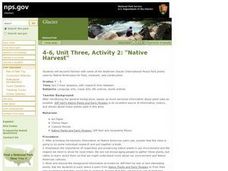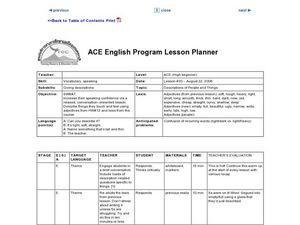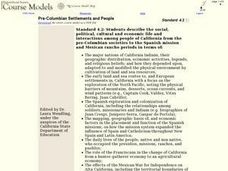Curated OER
The Early Peoples
Young scholars, after studying The Early Peoples, explain and give examples of how Native Americans and Europeans adapted to living in certain environments. They give examples of early cultures and settlements that existed in North...
Curated OER
Rights in Early America
Get your historians to hop into someone else's 18th century shoes with a simulation on rights in early America. Each individual gets an identity card, indicating their race, gender, and status (slave or free). Areas around the room are...
Curated OER
Then and Now: Life in Early America, 1740 - 1840
Young scholars complete a unit of lessons that examine life in early America from 1740-1840. They compare items with similar objects we use today, explore various websites, create a paper doll, try and guess the function of various...
Curated OER
Sticks, Stones, Sinews and Stuff: How Early People Used the Environment to Meet Basic Needs
Students create an artifact. In this early survival lesson, students use found objects to create an artifact that could have been used to help early people meet their basic needs.
Curated OER
Native Harvest
Students read Native Plants and Early Peoples and explore the plants in Waterton-Glacier International Peace Park and find how the Native Americans used them. In this Native American plant and people lesson, students research two types...
Curated OER
Early American English Lit Writing Assignment (Senior, Literature)
To better understand early American literature, which was usually written by Puritans coming to the new world, learners pretend they have just landed on Mars. They compose a letter home describing their experiences, the new landscape,...
Curated OER
PEOPLE OF THE STONE AGE
Sixth graders summarize how early people interacted to meet basic human needs. They observe how increased numbers of people and the search for food led to migration. Students analyze how the interactions among people led to the...
Curated OER
We the People Level 2
Students explore U.S. history by participating in a government activity. In this Constitution lesson plan, students identify the role government plays in our society and the differences the British colonies had in the early 18th century....
Curated OER
Early America: Jeopardy Game
Fifth graders can put their knowledge of early American life, the 13 colonies, and maps to the test when they play this Jeopardy game. The game covers terminology, famous people, and geography related to Colonial American times. Note:...
Carolina K-12
Early American Settlements
What brought settlers from Europe to North America? By exploring primary sources, such as posters seeking recruits for the new lands, class members take a deeper look at these motivations. To finish, they present their findings to...
Curated OER
Collecting Data to Learn About the People Around You
Human graphs, anyone? Did you eat fruit today? What is your favorite costume? Have your K – 6 learners graph the responses. Early elementary grades may count and compare while upper grades compare responses of different groups or make...
North Carolina School of Science and Mathematics
Henry Kissinger and Detente
How did relations between the United States and the People's Republic of China evolve between 1950 and 1970? Your young historians will complete a timeline of events with evidence that the relationship between these two great nations was...
Curated OER
Description of People and Things
Elementary schoolers use adjectives correctly in their speech. They demonstrate adjectives using familiar objects. (For example, they might show narrow by walking between two chairs placed closely together.) Then they play antonym Bingo...
Chicago Historical Society
Are We the People?
Taking on the roles of a fiery Boston patriot, a Philadelphia merchant's wife, and a prominent abolitionist, your young historians will consider the reactions of these early Americans to the creation of the Declaration of Independence,...
TCI
Picking Rusty Gold: Why Do People Buy and Sell Antiques?
Your historical sleuths will work to research the in-depth history of chosen artifacts and will use their research to design a fictional advertisement for an early 20th century item.
Museum of Tolerance
Disenfranchised People of the New Nation
Why are some immigrant groups in the United States embraced while others become disenfranchised? To answer this question, teams investigate why groups emigrated to the US, why some of these these peoples were disenfranchised, and their...
Anti-Defamation League
Impact of the U.S. Expansion on Indigenous People and Stereotypes About Native American People
The 2004 U.S. bicentennial sparks a discussion about its meaning and importance to United States history. Readings, maps, tables, and reflective writing prompt small groups to explore the westward expansion, Lewis and Clark, and how...
Curated OER
Early Industrialization
Eighth graders analyze primary source documents emphasizing young people in factory labor (mill workers during 1840-1860). They study hours of labor, ages of laborers, reasons for working, and working conditions. They write a poem or song.
Curated OER
Pre-Columbian Settlements and People
Fourth graders describe the social, political, cultural and economic life and interactions among the people of California from the pre-Columbian societies to the Spanish mission and Mexican rancho periods.
Curated OER
Early Americans - Their Culture and Law
Students examine the laws, food, clothing, and shelter of early American Indian cultures. They conduct research, answer questions, and plan and map out an early American Indian village.
Curated OER
Sectionalism in Early U.S.
Students, divided into three groups, representing the Northeastern, Southern, Western United States. They research these areas in early American history and as a group prepare charts, graphs and reports. They explain their needs and...
Curated OER
Prairie People
Eighth graders interview a person who explains the lifestyles of people who lived on the prairies in the eighteenth and nineteenth centuries. They examine how today's lifestyles impact the environment and write up what they learned.
Curated OER
Early Voting, Other Election Changes are Possible
Pupils use the internet and linked sites to explore current voting methods in their community. They research suggestions that have been made for changes and interview people who made these suggestions (when possible). Students suggest...
Curated OER
Living in the Oak Woodlands: Early People of the Jewett Mine Area
Students are introduced to the early peoples living in the Jewett Mine area. After viewing transparencies, they view pictures of the mine today and its main area of production. For each picture, they develop symbols and captions about...

























